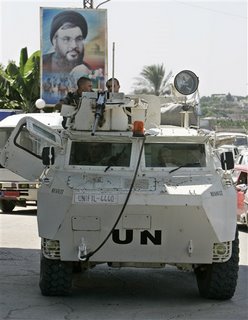The new rules of engagement for UNIFIL troops in Lebanon should assuage the concerns of the potential contributors to the mission, such as France. It is hoped, therefore, that the clearly-defined rules, which include the permission to use deadly force not only in self-defence but also to open up humanitarian corridors, to protect civilians under imminent threat, and defend the Lebanese Army from assault, will lead to the level of contribution which would sustain the projected 15,000 troops by November.
 All is well, and there is nothing like a clear mandate granting sufficient powers to accomplish a mission. The problem, however, is that the so-called permission to use deadly force risks being employed only when Hezbollah is seen as a threat. I find it extremely difficult to imagine that UNIFIL members would dare confront Israeli forces in Lebanon. Not only is the IDF orders of magnitude more efficient and better-equipped than the sum of the UNIFIL deployment, but the diplomatic fallout of a military exchange between a UN force and Israel would have overwhelmingly deleterious consequences for the mission, of which the death of UN officials would only be the beginning. Can we really expect, say, Nepalese soldiers attempting to stop an Israeli F-16 from bombing a village in southern Lebanon? As history has shown, the Jewish state has no compunction about targeting civilians or UN soldiers and will do so again if they are seen as preventing it from achieving its objectives. But any military action taken on the part of UNIFIL against Israel will echo back into the halls of UN headquarters in New York, where accusations of anti-Semitism will be directed not only at the country that used force but at the entire UN architecture, against which Israel has already launched many such accusations.
All is well, and there is nothing like a clear mandate granting sufficient powers to accomplish a mission. The problem, however, is that the so-called permission to use deadly force risks being employed only when Hezbollah is seen as a threat. I find it extremely difficult to imagine that UNIFIL members would dare confront Israeli forces in Lebanon. Not only is the IDF orders of magnitude more efficient and better-equipped than the sum of the UNIFIL deployment, but the diplomatic fallout of a military exchange between a UN force and Israel would have overwhelmingly deleterious consequences for the mission, of which the death of UN officials would only be the beginning. Can we really expect, say, Nepalese soldiers attempting to stop an Israeli F-16 from bombing a village in southern Lebanon? As history has shown, the Jewish state has no compunction about targeting civilians or UN soldiers and will do so again if they are seen as preventing it from achieving its objectives. But any military action taken on the part of UNIFIL against Israel will echo back into the halls of UN headquarters in New York, where accusations of anti-Semitism will be directed not only at the country that used force but at the entire UN architecture, against which Israel has already launched many such accusations.Increasingly, it's starting to look like UNIFIL 2.0 is being constituted not so that it can ensure stability in the region, but to please Israel and, perhaps, do its work on the ground. While the mandate does not currently request the forceful disarmament of Hezbollah, it sure is starting to look like this might be the next step. There is no certainty that a Hezbollah that sees UNIFIL to be but a pawn of Jerusalem (and Washington) will choose to live peacefully with it. Given the disparate nature of its constituents, there is no way UNIFIL could survive a guerrilla war with Hezbollah on Lebanese territory. Israel was unable to do so. Even the United States gets chills at night when it thinks back on what happened to its marines in the 1980s. What seems to have been accomplished is the textbook error, which the international community committed in the very same country in the 1980s, of taking sides. Whether they want to or not, the UN and contributing countries to UNIFIL will be expected to do Israel's bidding. This is a classic mistake, and it very well could be a deadly one.
What all this means for UNIFIL is that before it even has deployed, it already finds itself between a rock a and a hard place: confront Hezbollah in a war it cannot win, or face up to Israel, which it equally cannot afford. We therefore have a UN deployment, however muscular the UN mandate, whose only chance of "success" (however one defines it) is contingent upon the two sides respecting the ceasefire. Things are going to get ugly before they get better, of that this writer is certain.

No comments:
Post a Comment
Note: Only a member of this blog may post a comment.